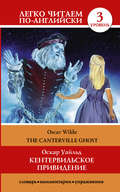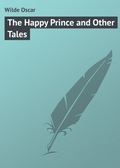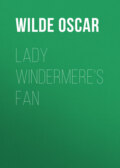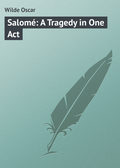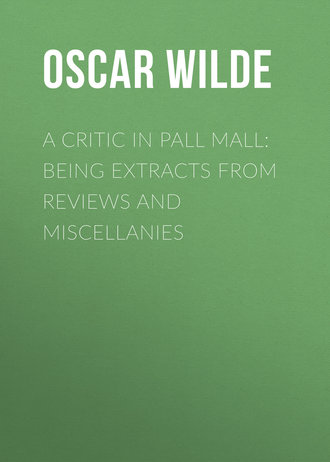
Оскар Уайльд
A Critic in Pall Mall: Being Extracts from Reviews and Miscellanies
MR. W. B. YEATS
(Woman’s World, March 1889.)
‘The Wanderings of Oisin and Other Poems is, I believe, the first volume of poems that Mr. Yeats has published, and it is certainly full of promise. It must be admitted that many of the poems are too fragmentary, too incomplete. They read like stray scenes out of unfinished plays, like things only half remembered, or, at best, but dimly seen. But the architectonic power of construction, the power to build up and make perfect a harmonious whole, is nearly always the latest, as it certainly is the highest, development of the artistic temperament. It is somewhat unfair to expect it in early work. One quality Mr. Yeats has in a marked degree, a quality that is not common in the work of our minor poets, and is therefore all the more welcome to us – I mean the romantic temper. He is essentially Celtic, and his verse, at its best, is Celtic also. Strongly influenced by Keats, he seems to study how to ‘load every rift with ore,’ yet is more fascinated by the beauty of words than by the beauty of metrical music. The spirit that dominates the whole book is perhaps more valuable than any individual poem or particular passage, but this from The Wanderings of Oisin is worth quoting. It describes the ride to the Island of Forgetfulness:
And the ears of the horse went sinking away in the hollow light,
For, as drift from a sailor slow drowning the gleams of the world and the sun,
Ceased on our hands and faces, on hazel and oak leaf, the light,
And the stars were blotted above us, and the whole of the world was one;
Till the horse gave a whinny; for cumbrous with stems of the hazel and oak,
Of hollies, and hazels, and oak-trees, a valley was sloping away
From his hoofs in the heavy grasses, with monstrous slumbering folk,
Their mighty and naked and gleaming bodies heaped loose where they lay.
More comely than man may make them, inlaid with silver and gold,
Were arrow and shield and war-axe, arrow and spear and blade,
And dew-blanched horns, in whose hollows a child of three years old
Could sleep on a couch of rushes, round and about them laid.
And this, which deals with the old legend of the city lying under the waters of a lake, is strange and interesting:
The maker of the stars and worlds
Sat underneath the market cross,
And the old men were walking, walking,
And little boys played pitch-and-toss.
‘The props,’ said He, ‘of stars and worlds
Are prayers of patient men and good.
The boys, the women, and old men,
Listening, upon their shadows stood.
A grey professor passing cried,
‘How few the mind’s intemperance rule!
What shallow thoughts about deep things!
The world grows old and plays the fool.’
The mayor came, leaning his left ear —
There were some talking of the poor —
And to himself cried, ‘Communist!’
And hurried to the guardhouse door.
The bishop came with open book,
Whispering along the sunny path;
There was some talking of man’s God,
His God of stupor and of wrath.
The bishop murmured, ‘Atheist!
How sinfully the wicked scoff!’
And sent the old men on their way,
And drove the boys and women off.
The place was empty now of people;
A cock came by upon his toes;
An old horse looked across the fence,
And rubbed along the rail his nose.
The maker of the stars and worlds
To His own house did Him betake,
And on that city dropped a tear,
And now that city is a lake.
Mr. Yeats has a great deal of invention, and some of the poems in his book, such as Mosada, Jealousy, and The Island of Statues, are very finely conceived. It is impossible to doubt, after reading his present volume, that he will some day give us work of high import. Up to this he has been merely trying the strings of his instrument, running over the keys.
The Wanderings of Oisin and Other Poems. By W. B. Yeats. (Kegan Paul.)
MR. YEATS’S WANDERINGS OF OISIN
(Pall Mall Gazette, July 12, 1889.)
Books of poetry by young writers are usually promissory notes that are never met. Now and then, however, one comes across a volume that is so far above the average that one can hardly resist the fascinating temptation of recklessly prophesying a fine future for its author. Such a book Mr. Yeats’s Wanderings of Oisin certainly is. Here we find nobility of treatment and nobility of subject-matter, delicacy of poetic instinct and richness of imaginative resource. Unequal and uneven much of the work must be admitted to be. Mr. Yeats does not try to ‘out-baby’ Wordsworth, we are glad to say; but he occasionally succeeds in ‘out-glittering’ Keats, and, here and there, in his book we come across strange crudities and irritating conceits. But when he is at his best he is very good. If he has not the grand simplicity of epic treatment, he has at least something of the largeness of vision that belongs to the epical temper. He does not rob of their stature the great heroes of Celtic mythology. He is very naïve and very primitive and speaks of his giants with the air of a child. Here is a characteristic passage from the account of Oisin’s return from the Island of Forgetfulness:
And I rode by the plains of the sea’s edge, where all is barren and grey,
Grey sands on the green of the grasses and over the dripping trees,
Dripping and doubling landward, as though they would hasten away
Like an army of old men longing for rest from the moan of the seas.
Long fled the foam-flakes around me, the winds fled out of the vast,
Snatching the bird in secret, nor knew I, embosomed apart,
When they froze the cloth on my body like armour riveted fast,
For Remembrance, lifting her leanness, keened in the gates of my heart.
Till fattening the winds of the morning, an odour of new-mown hay
Came, and my forehead fell low, and my tears like berries fell down;
Later a sound came, half lost in the sound of a shore far away,
From the great grass-barnacle calling, and later the shore-winds brown.
If I were as I once was, the gold hooves crushing the sand and the shells,
Coming forth from the sea like the morning with red lips murmuring a song,
Not coughing, my head on my knees, and praying, and wroth with the bells,
I would leave no Saint’s head on his body, though spacious his lands were and strong.
Making way from the kindling surges, I rode on a bridle-path,
Much wondering to see upon all hands, of wattle and woodwork made,
Thy bell-mounted churches, and guardless the sacred cairn and the earth,
And a small and feeble populace stooping with mattock and spade.
In one or two places the music is faulty, the construction is sometimes too involved, and the word ‘populace’ in the last line is rather infelicitous; but, when all is said, it is impossible not to feel in these stanzas the presence of the true poetic spirit.
The Wanderings of Oisin and other Poems. By W. B. Yeats. (Kegan Paul.)
MR. WILLIAM MORRIS’S LAST BOOK
(Pall Mall Gazette, March 2, 1889.)
Mr. Morris’s last book is a piece of pure art workmanship from beginning to end, and the very remoteness of its style from the common language and ordinary interests of our day gives to the whole story a strange beauty and an unfamiliar charm. It is written in blended prose and verse, like the mediæval ‘cante-fable,’ and tells the tale of the House of the Wolfings in its struggles against the legionaries of Rome then advancing into Northern Germany. It is a kind of Saga, and the language in which the folk-epic, as we may call it, is set forth recalls the antique dignity and directness of our English tongue four centuries ago. From an artistic point of view it may be described as an attempt to return by a self-conscious effort to the conditions of an earlier and a fresher age. Attempts of this kind are not uncommon in the history of art. From some such feeling came the Pre-Raphaelite movement of our own day and the archaistic movement of later Greek sculpture. When the result is beautiful the method is justified, and no shrill insistence upon a supposed necessity for absolute modernity of form can prevail against the value of work that has the incomparable excellence of style. Certainly, Mr. Morris’s work possesses this excellence. His fine harmonies and rich cadences create in the reader that spirit by which alone can its own spirit be interpreted, awake in him something of the temper of romance and, by taking him out of his own age, place him in a truer and more vital relation to the great masterpieces of all time. It is a bad thing for an age to be always looking in art for its own reflection. It is well that, now and then, we are given work that is nobly imaginative in its method and purely artistic in its aim. As we read Mr. Morris’s story with its fine alternations of verse and prose, its decorative and descriptive beauties, its wonderful handling of romantic and adventurous themes, we cannot but feel that we are as far removed from the ignoble fiction as we are from the ignoble facts of our own day. We breathe a purer air, and have dreams of a time when life had a kind of poetical quality of its own, and was simple and stately and complete.
The tragic interest of The House of the Wolfings centres round the figure of Thiodolf, the great hero of the tribe. The goddess who loves him gives him, as he goes to battle against the Romans, a magical hauberk on which rests this strange fate: that he who wears it shall save his own life and destroy the life of his land. Thiodolf, finding out this secret, brings the hauberk back to the Wood-Sun, as she is called, and chooses death for himself rather than the ruin of his cause, and so the story ends.
But Mr. Morris has always preferred romance to tragedy, and set the development of action above the concentration of passion. His story is like some splendid old tapestry crowded with stately images and enriched with delicate and delightful detail. The impression it leaves on us is not of a single central figure dominating the whole, but rather of a magnificent design to which everything is subordinated, and by which everything becomes of enduring import. It is the whole presentation of the primitive life that really fascinates. What in other hands would have been mere archæology is here transformed by quick artistic instinct and made wonderful for us, and human and full of high interest. The ancient world seems to have come to life again for our pleasure.
Of a work so large and so coherent, completed with no less perfection than it is conceived, it is difficult by mere quotation to give any adequate idea. This, however, may serve as an example of its narrative power. The passage describes the visit of Thiodolf to the Wood-Sun:
The moonlight lay in a great flood on the grass without, and the dew was falling in the coldest hour of the night, and the earth smelled sweetly: the whole habitation was asleep now, and there was no sound to be known as the sound of any creature, save that from the distant meadow came the lowing of a cow that had lost her calf, and that a white owl was flitting about near the eaves of the Roof with her wild cry that sounded like the mocking of merriment now silent. Thiodolf turned toward the wood, and walked steadily through the scattered hazel-trees, and thereby into the thick of the beech-trees, whose boles grew smooth and silver-grey, high and close-set: and so on and on he went as one going by a well-known path, though there was no path, till all the moonlight was quenched under the close roof of the beech-leaves, though yet for all the darkness, no man could go there and not feel that the roof was green above him. Still he went on in despite of the darkness, till at last there was a glimmer before him, that grew greater till he came unto a small wood-lawn whereon the turf grew again, though the grass was but thin, because little sunlight got to it, so close and thick were the tall trees round about it… Nought looked Thiodolf either at the heavens above, or the trees, as he strode from off the husk-strewn floor of the beech wood on to the scanty grass of the lawn, but his eyes looked straight before him at that which was amidmost of the lawn: and little wonder was that; for there on a stone chair sat a woman exceeding fair, clad in glittering raiment, her hair lying as pale in the moonlight on the grey stone as the barley acres in the August night before the reaping-hook goes in amongst them. She sat there as though she were awaiting some one, and he made no stop nor stay, but went straight up to her, and took her in his arms, and kissed her mouth and her eyes, and she him again; and then he sat himself down beside her.
As an example of the beauty of the verse we would take this from the song of the Wood-Sun. It at least shows how perfectly the poetry harmonizes with the prose, and how natural the transition is from the one to the other:
In many a stead Doom dwelleth, nor sleepeth day nor night:
The rim of the bowl she kisseth, and beareth the chambering light
When the kings of men wend happy to the bride-bed from the board.
It is little to say that she wendeth the edge of the grinded sword,
When about the house half builded she hangeth many a day;
The ship from the strand she shoveth, and on his wonted way
By the mountain hunter fareth where his foot ne’er failed before:
She is where the high bank crumbles at last on the river’s shore:
The mower’s scythe she whetteth; and lulleth the shepherd to sleep
Where the deadly ling-worm wakeneth in the desert of the sheep.
Now we that come of the God-kin of her redes for ourselves we wot,
But her will with the lives of men-folk and their ending know we not.
So therefore I bid thee not fear for thyself of Doom and her deed.
But for me: and I bid thee hearken to the helping of my need.
Or else – Art thou happy in life, or lusteth thou to die
In the flower of thy days, when thy glory and thy longing bloom on high?
The last chapter of the book in which we are told of the great feast made for the dead is so finely written that we cannot refrain from quoting this passage:
Now was the glooming falling upon the earth; but the Hall was bright within even as the Hall-Sun had promised. Therein was set forth the Treasure of the Wolfings; fair cloths were hung on the walls, goodly broidered garments on the pillars: goodly brazen cauldrons and fair-carven chests were set down in nooks where men could see them well, and vessels of gold and silver were set all up and down the tables of the feast. The pillars also were wreathed with flowers, and flowers hung garlanded from the walls over the precious hangings; sweet gums and spices were burning in fair-wrought censers of brass, and so many candles were alight under the Roof, that scarce had it looked more ablaze when the Romans had litten the faggots therein for its burning amidst the hurry of the Morning Battle.
There then they fell to feasting, hallowing in the high-tide of their return with victory in their hands: and the dead corpses of Thiodolf and Otter, clad in precious glittering raiment, looked down on them from the High-seat, and the kindreds worshipped them and were glad; and they drank the Cup to them before any others, were they Gods or men.
In days of uncouth realism and unimaginative imitation, it is a high pleasure to welcome work of this kind. It is a work in which all lovers of literature cannot fail to delight.
A Tale of the House of the Wolfings and all the Kindreds of the Mark. Written in Prose and in Verse by William Morris. (Reeves and Turner.)
SOME LITERARY NOTES
(Woman’s World, April 1889.)
‘In modern life,’ said Matthew Arnold once, ‘you cannot well enter a monastery; but you can enter the Wordsworth Society.’ I fear that this will sound to many a somewhat uninviting description of this admirable and useful body, whose papers and productions have been recently published by Professor Knight, under the title of Wordsworthiana. ‘Plain living and high thinking’ are not popular ideals. Most people prefer to live in luxury, and to think with the majority. However, there is really nothing in the essays and addresses of the Wordsworth Society that need cause the public any unnecessary alarm; and it is gratifying to note that, although the society is still in the first blush of enthusiasm, it has not yet insisted upon our admiring Wordsworth’s inferior work. It praises what is worthy of praise, reverences what should be reverenced, and explains what does not require explanation. One paper is quite delightful; it is from the pen of Mr. Rawnsley, and deals with such reminiscences of Wordsworth as still linger among the peasantry of Westmoreland. Mr. Rawnsley grew up, he tells us, in the immediate vicinity of the present Poet-Laureate’s old home in Lincolnshire, and had been struck with the swiftness with which,
As year by year the labourer tills
His wonted glebe, or lops the glades,
the memories of the poet of the Somersby Wold had ‘faded from off the circle of the hills’ – had, indeed, been astonished to note how little real interest was taken in him or his fame, and how seldom his works were met with in the houses of the rich or poor in the very neighbourhood. Accordingly, when he came to reside in the Lake Country, he endeavoured to find out what of Wordsworth’s memory among the men of the Dales still lingered on – how far he was still a moving presence among them – how far his works had made their way into the cottages and farmhouses of the valleys. He also tried to discover how far the race of Westmoreland and Cumberland farm-folk – the ‘Matthews’ and the ‘Michaels’ of the poet, as described by him – were real or fancy pictures, or how far the characters of the Dalesmen had been altered in any remarkable manner by tourist influences during the thirty-two years that have passed since the Lake poet was laid to rest.
With regard to the latter point, it will be remembered that Mr. Ruskin, writing in 1876, said that ‘the Border peasantry, painted with absolute fidelity by Scott and Wordsworth,’ are, as hitherto, a scarcely injured race; that in his fields at Coniston he had men who might have fought with Henry v. at Agincourt without being distinguished from any of his knights; that he could take his tradesmen’s word for a thousand pounds, and need never latch his garden gate; and that he did not fear molestation, in wood or on moor, for his girl guests. Mr. Rawnsley, however, found that a certain beauty had vanished which the simple retirement of old valley days fifty years ago gave to the men among whom Wordsworth lived. ‘The strangers,’ he says, ‘with their gifts of gold, their vulgarity, and their requirements, have much to answer for.’ As for their impressions of Wordsworth, to understand them one must understand the vernacular of the Lake District. ‘What was Mr. Wordsworth like in personal appearance?’ said Mr. Rawnsley once to an old retainer, who still lives not far from Rydal Mount. ‘He was a ugly-faäced man, and a meän-liver,’ was the answer; but all that was really meant was that he was a man of marked features, and led a very simple life in matters of food and raiment. Another old man, who believed that Wordsworth ‘got most of his poetry out of Hartley,’ spoke of the poet’s wife as ‘a very onpleasant woman, very onpleasant indeed. A close-fisted woman, that’s what she was.’ This, however, seems to have been merely a tribute to Mrs. Wordsworth’s admirable housekeeping qualities.
The first person interviewed by Mr. Rawnsley was an old lady who had been once in service at Rydal Mount, and was, in 1870, a lodging-house keeper at Grasmere. She was not a very imaginative person, as may be gathered from the following anecdote: – Mr. Rawnsley’s sister came in from a late evening walk, and said, ‘O Mrs. D-, have you seen the wonderful sunset?’ The good lady turned sharply round and, drawing herself to her full height, as if mortally offended, answered: ‘No, miss; I’m a tidy cook, I know, and “they say” a decentish body for a landlady, but I don’t knaw nothing about sunsets or them sort of things, they’ve never been in my line.’ Her reminiscence of Wordsworth was as worthy of tradition as it was explanatory, from her point of view, of the method in which Wordsworth composed, and was helped in his labours by his enthusiastic sister. ‘Well, you know,’ she said, ‘Mr. Wordsworth went humming and booing about, and she, Miss Dorothy, kept close behint him, and she picked up the bits as he let ’em fall, and tak’ ’em down, and put ’em together on paper for him. And you may be very well sure as how she didn’t understand nor make sense out of ’em, and I doubt that he didn’t know much about them either himself, but, howivver, there’s a great many folk as do, I dare say.’ Of Wordsworth’s habit of talking to himself, and composing aloud, we hear a great deal. ‘Was Mr. Wordsworth a sociable man?’ asked Mr. Rawnsley of a Rydal farmer. ‘Wudsworth, for a’ he had noa pride nor nowt,’ was the answer, ‘was a man who was quite one to hissel, ye kna. He was not a man as folks could crack wi’, nor not a man as could crack wi’ folks. But there was another thing as kep’ folk off, he had a ter’ble girt deep voice, and ye might see his faace agaan for long enuff. I’ve knoan folks, village lads and lasses, coming over by old road above, which runs from Grasmere to Rydal, flayt a’most to death there by Wishing Gaate to hear the girt voice a groanin’ and mutterin’ and thunderin’ of a still evening. And he had a way of standin’ quite still by the rock there in t’ path under Rydal, and folks could hear sounds like a wild beast coming from the rocks, and childer were scared fit to be dead a’most.’
Wordsworth’s description of himself constantly recurs to one:
And who is he with modest looks,
And clad in sober russet gown?
He murmurs by the running brooks,
A music sweeter than their own;
He is retired as noontide dew,
Or fountain in a noonday grove.
But the corroboration comes in strange guise. Mr. Rawnsley asked one of the Dalesmen about Wordsworth’s dress and habits. This was the reply: ‘Wudsworth wore a Jem Crow, never seed him in a boxer in my life, – a Jem Crow and an old blue cloak was his rig, and as for his habits, he had noan; niver knew him with a pot i’ his hand, or a pipe i’ his mouth. But he was a greät skater, for a’ that – noan better in these parts – why, he could cut his own naäme upo’ the ice, could Mr. Wudsworth.’ Skating seems to have been Wordsworth’s one form of amusement. He was ‘over feckless i’ his hands’ – could not drive or ride – ‘not a bit of fish in him,’ and ‘nowt of a mountaineer.’ But he could skate. The rapture of the time when, as a boy, on Esthwaite’s frozen lake, he had
wheeled about,
Proud and exulting like an untired horse
That cares not for his home, and, shod with steel,
Had hissed along the polished ice,
was continued, Mr. Rawnsley tells us, into manhood’s later day; and Mr. Rawnsley found many proofs that the skill the poet had gained, when
Not seldom from the uproar he retired,
Into a silent bay, or sportively
Glanced sideways, leaving the tumultuous throng
To cut across the reflex of a star,
was of such a kind as to astonish the natives among whom he dwelt. The recollection of a fall he once had, when his skate caught on a stone, still lingers in the district. A boy had been sent to sweep the snow from the White Moss Tarn for him. ‘Did Mr. Wudsworth gie ye owt?’ he was asked, when he returned from his labour. ‘Na, but I seed him tumlle, though!’ was the answer. ‘He was a ter’ble girt skater, was Wudsworth now,’ says one of Mr. Rawnsley’s informants; ‘he would put one hand i’ his breast (he wore a frill shirt i’ them days), and t’ other hand i’ his waistband, same as shepherds does to keep their hands warm, and he would stand up straight and sway and swing away grandly.’
Of his poetry they did not think much, and whatever was good in it they ascribed to his wife, his sister, and Hartley Coleridge. He wrote poetry, they said, ‘because he couldn’t help it – because it was his hobby’ – for sheer love, and not for money. They could not understand his doing work ‘for nowt,’ and held his occupation in somewhat light esteem because it did not bring in ‘a deal o’ brass to the pocket.’ ‘Did you ever read his poetry, or see any books about in the farmhouses?’ asked Mr. Rawnsley. The answer was curious: ‘Ay, ay, time or two. But ya’re weel aware there’s potry and potry. There’s potry wi’ a li’le bit pleasant in it, and potry sic as a man can laugh at or the childer understand, and some as takes a deal of mastery to make out what’s said, and a deal of Wudsworth’s was this sort, ye kna. You could tell fra the man’s faace his potry would niver have no laugh in it. His potry was quite different work from li’le Hartley. Hartley ’ud goa running along beside o’ the brooks and mak his, and goa in the first oppen door and write what he had got upo’ paper. But Wudsworth’s potry was real hard stuff, and bided a deal of makking, and he’d keep it in his head for long enough. Eh, but it’s queer, mon, different ways folks hes of making potry now… Not but what Mr. Wudsworth didn’t stand very high, and was a well-spoken man enough.’ The best criticism on Wordsworth that Mr. Rawnsley heard was this: ‘He was an open-air man, and a great critic of trees.’
There are many useful and well-written essays in Professor Knight’s volume, but Mr. Rawnsley’s is far the most interesting of all. It gives us a graphic picture of the poet as he appeared in outward semblance and manner to those about whom he wrote.
Wordsworthiana: A Selection from Papers read to the Wordsworth Society. Edited by William Knight. (Macmillan and Co.)



